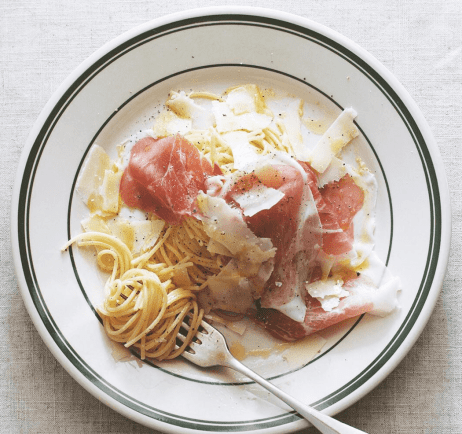
Everyone knows alcohol and pregnancy don't mix, but are you aware of these six other foods you should never include in your diet while pregnant? It's best to avoid these foods at all costs to ensure your eating habits don't harm your growing baby.
1. Large amounts of refined grains
These include white rice, pasta, white bread and pastries. Expectant moms with diabetes should take extra note: a recent study found children born to women with gestational diabetes whose diet included high proportions of refined grains are twice as likely to become obese by age seven.
Diabetes or not, refined grains should be avoided in large quantities - previously studies have linked diets high in refined grains to obesity, type 2 diabetes, and heart disease.
2. Undercooked and refrigerated meats
We know that animal protein can harbor parasites or bacteria that can cause food poisoning, but the possible effects are more severe for pregnant women. It is not safe for expecting moms to eat raw or undercooked meat, poultry or fish because these foods can harbor listeria. Even eating deli meat while pregnant can be dangerous.
Pregnancy increases your risk for listeriosis, which can cause you severe illness and can be passed down to your baby. Moms who love sushi and rare steaks are urged to save those treats until after pregnancy.
3. Caffeine
Caffeine has long been linked to adverse birth effects in children, causing many expecting mothers to give up their coffee, tea and soda. One study found a strong correlation between caffeine consumption and low birth weight. After surveying hundreds of expectant mothers' caffeine habits, the study concluded that caffeine intake was consistently associated with decreased body weight and increased odds of the baby being small for their gestational age.
4. Cod liver oil
Dietician Sara Shencker says that while fish and supplements made from the body of the fish (like Omega-3) are good to include in your diet while pregnant, supplements made from the liver of fish, such as cod liver oil, are not safe to take in pregnancy. Cod liver oil contains high levels of the retinol form of Vitamin A, which can harm your baby if taken in large amounts.
5. Raw or runny eggs
Unfortunately, it's best for expecting moms to resist the temptation of snagging a bite of cookie dough or frying eggs sunny side up. Raw or runny eggs can spread several different kinds of bacteria, include salmonella, listeria and Toxoplasma gondii. You're more more susceptible to infections while pregnant, and bacteria intestinal infections from eggs can cause serious complications in pregnancy.
6. Unwashed fruits and veggies
Toxoplasma is a parasite that can be found in unwashed fruits and veggies, and it is detrimental to the health of pregnant women and their babies. Be sure to thoroughly wash raw fruits and veggies before preparing - even if you don't eat the outside (like melons or oranges).
An action as simple as rinsing off your apple can save a baby from the effects of toxoplasmosis, which include hearing loss, intellectual disability and blindness, brain development problems and vision problems, according to the FDA.
What you SHOULD be eating
WebMD suggests all expecting mothers include the following in their diets every day:
-
At least four servings of dairy and calcium-rich foods a day to ensure you are getting 1000-1300 mg calcium.
-
At least three servings of iron-rich foods (lean red meats, oats, spinach, beans, etc.) to eat at least 27 mg of iron.
-
Enough iodine-rich foods (cottage cheese, yogurt, bake potatoes, salmon, shrimp, etc.) to reach 220 micrograms daily.
-
At least one serving of vitamin-C rich foods (citrus, broccoli, tomatoes, strawberries, etc.) to eat a minimum of 80 mg vitamin.
-
At least one good source of folate (dark green leafy vegetables, veal, legumes, etc.) to reach .64 mg of folate.
-
At least one serving of food high in vitamin A every day (carrots, pumpkin, cantaloupe, sweet potatoes, etc).
You're eating for two now, which means more than just getting away with a second serving - you also need to be careful with how your diet affects your little one. With just a little tweaking, you can eat foods that can help your growing baby be as healthy as possible.

